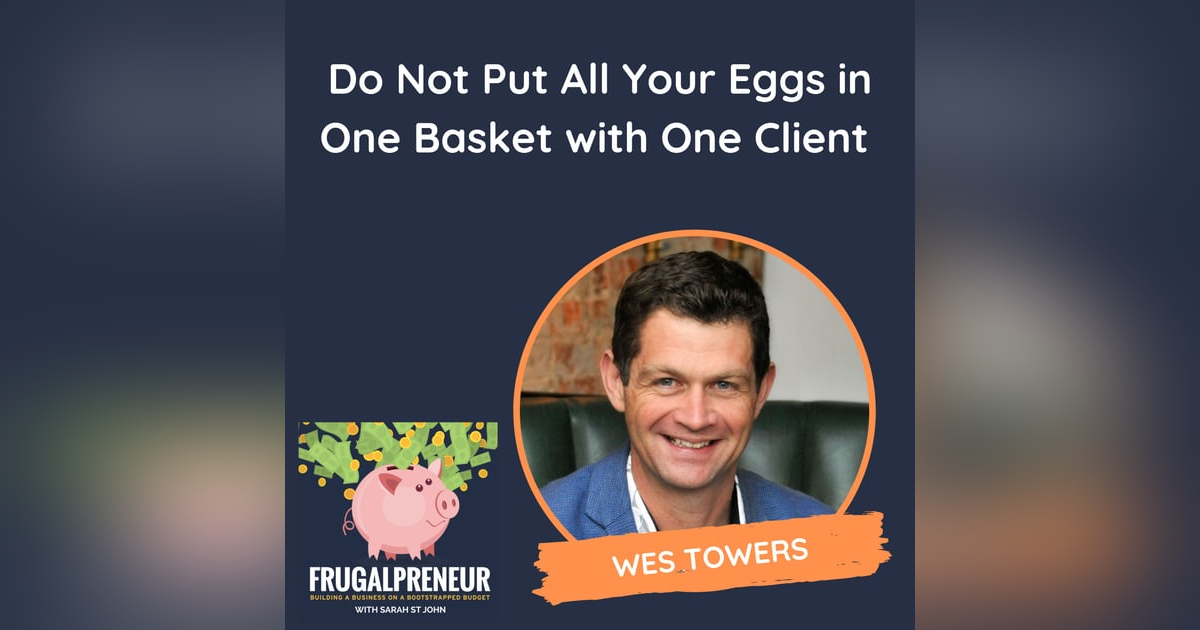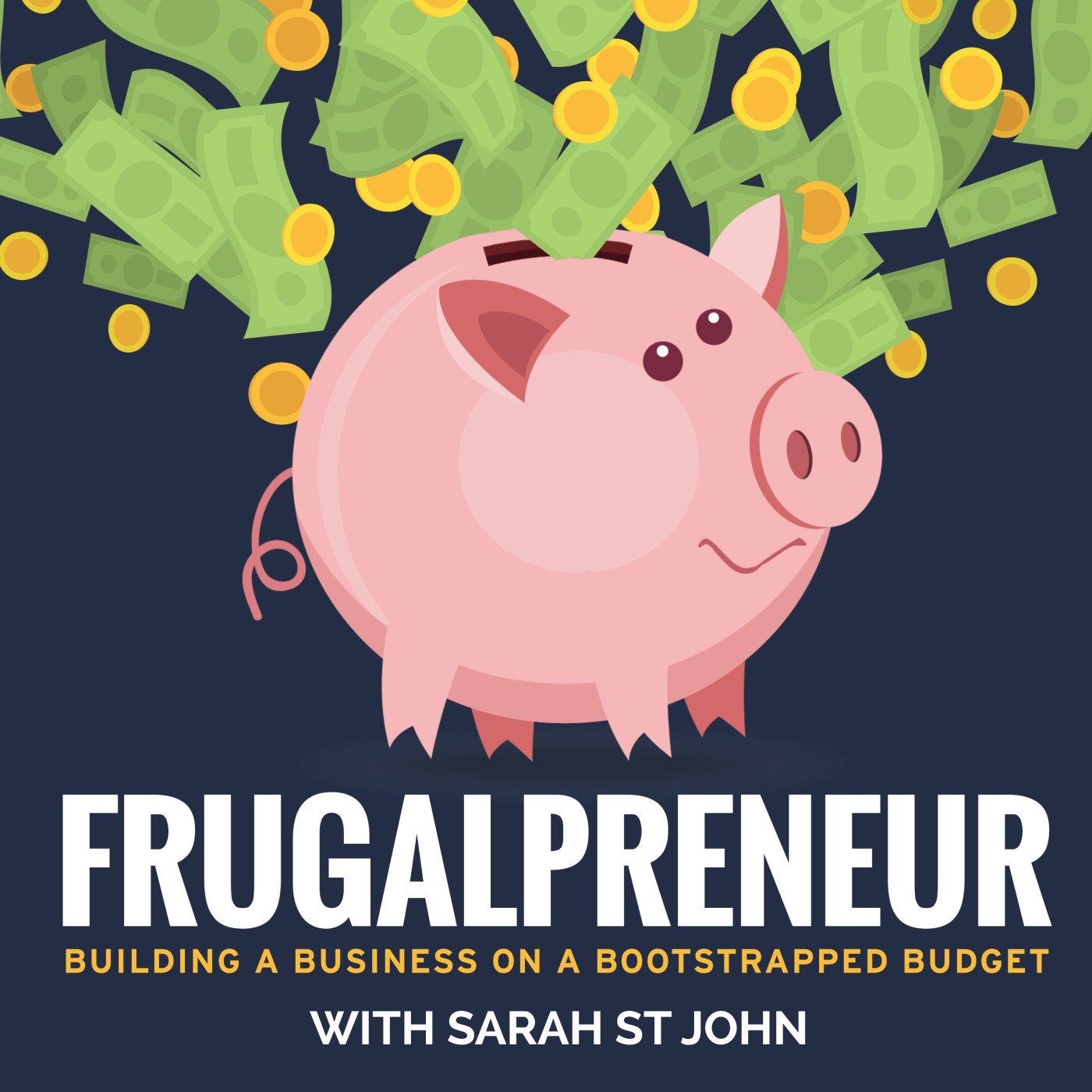Do Not Put All Your Eggs in One Basket with One Client (with Wes Towers)

The focal point of this podcast episode resides in an enlightening discussion with a bootstrapped entrepreneur (Wes Towers) who delineates the intricate journey of establishing a business with minimal financial investment. Wes articulates the evolution of their career, initially rooted in graphic design, which serendipitously transitioned into web design during the nascent stages of the internet era. Throughout the dialogue, they elucidate the paramount importance of maintaining a lean operational model, sharing insights into the significance of prudent financial management and the perils of over-reliance on singular clients. Wes' narrative underscores the necessity of cultivating relationships and trust within the business domain, thereby highlighting the irreplaceable human element in the age of burgeoning technology. By the conclusion of the episode, I aim for listeners to glean actionable strategies that can be expeditiously integrated into their own entrepreneurial endeavors.
Central to the discussion is Wes' strategic approach to entrepreneurship, characterized by a judicious allocation of resources and a commitment to maintaining a lean operational model. Wes reflects on their initial foray into business, which involved a methodical process of skill acquisition and gradual scaling of their operations. This approach not only mitigated financial risk but also facilitated a deeper understanding of client needs and market dynamics. The narrative reveals the challenges encountered when a lucrative client relationship began to monopolize their time, ultimately leading to an existential crisis where the guest realized the necessity of defining their target clientele to foster sustainable growth.
Furthermore, the episode delves into the implications of emerging technologies, particularly artificial intelligence, on the landscape of entrepreneurship. Wes articulates a perspective that encourages entrepreneurs to harness these tools effectively while ensuring that the human aspect of business—building trust and nurturing relationships—remains at the forefront. This nuanced exploration of the entrepreneurial journey offers invaluable lessons for listeners, urging them to remain focused on their core objectives and to cultivate relationships that enhance their business endeavors. Ultimately, the episode serves as a rich resource for aspiring entrepreneurs, providing them with actionable strategies and a renewed sense of purpose in their bootstrap journeys.
Takeaways:
- The episode emphasizes the significance of bootstrapping a business with minimal initial investment, focusing on practical steps and strategies.
- A critical lesson shared involves the potential pitfalls of relying too heavily on a single client, which can stifle business growth and creativity.
- Wes advocates for the importance of establishing strong relationships in business, as trust and personal connections drive client engagement.
- Listeners are encouraged to select reliable tools for project management, emphasizing consistency and familiarity to enhance team productivity.
- Wes discusses the evolving landscape of business due to artificial intelligence, urging entrepreneurs to leverage technology while maintaining a human touch.
- Finding a niche market is presented as a vital strategy for success, allowing for focused marketing efforts and improved client satisfaction.
Relevant Links
00:00 - Untitled
00:44 - Untitled
01:07 - Introduction to Bootstrapped Entrepreneurship
01:59 - The Evolution of Web Design
02:59 - The Bootstrap Strategy: Starting Small
04:24 - Navigating Client Relationships
05:46 - The Impact of AI on Business Dynamics
06:32 - Building Trust Through Relationships
Welcome to the Frugalpreneur podcast. I am your host, Sarah St. John.This episode is what I refer to as a showcase episode where I feature a bootstrapped entrepreneur and they briefly share their tips, tricks, tactics, techniques and tools that help them bootstrap their business and the successes and failures along the way.My hope is that each of these showcase episodes will provide at least one valuable takeaway that you can implement with right away in your own bootstrap business journey. Now onto the episode.
Wes TowersI was studying in high school in the 90s and web design really wasn't a thing. But I enjoyed designing. So I pursued graphic design slash multimedia and did that at uni. And along that journey websites sort of became a thing.By the time I started working, I worked in my first gig in an award winning marketing company in Sydney. They'd never designed a website before that, that was the year 2000.It's bizarre to think now that a marketing company of that caliber had never even designed a website. They only had one computer connected to the Internet, a dial up modem. So everyone shared the email on that device as well.So it's funny how far things come. But they won a little project to design a website and they said right, you're the young guy, you better learn how to do it.So they gave me ample time, they gave me opportunity to study how to do design a website.I already had the graphic design background, so just the technical aspect and built that first site out and from there on I became their web guy on it evolved to become that I was a specialist really in website design eventually. So I've enjoyed the journey. So I didn't really start a bootstrap business intentionally. I started because that's all I could do really.I started with the intention to one day grow a business, but to learn how to do business. So I didn't put at risk anything other than my time initially working in the evenings as a side hustle really.And once I saw that take shape and then I could transition to working a couple of days a week on the business, I did that and transitioned till eventually I was full time freelancer. And so I didn't risk anything by what might be called a bootstrap strategy. I just got the very bare minimum.So I forgot some business cards, not even flyers or anything like that, ended up building my own website as a website designer developer. Obviously you need to have your own website and that's next to nothing to host the website. So the email associated with that.So realistically the domain name, the hosting for the website, the business card, and a few little networking events I paid for that was as lean and as mean as I could possibly make it. That's all I could afford. And built it up from there until I could afford a little bit more marketing.But even so, I've never got heavily invested in big expenses. I've always kept the expense ratio pretty lean. Mistake that I made might sound a little bit counterintuitive to some degree.In bootstrapping the business fairly early on, I managed to win a really large client. So and then it eventually was taking up nearly full time hours.The challenge with that was they felt like they owned me and effectively I didn't have a business, but I just had a job and was being paid as a contractor really.But realistically, they owned me, they owned my time and it reduced my capacity to actually grow a business with multiple clients, multiple streams of income, and it was all dependent on me. So I couldn't build out a team at all.So my biggest failing really was winning a massive client and letting that own me and work as if I was an employee. So that's the biggest failing, biggest success was to fire that client. So to move on to define precisely what type of clients I wanted to work with.And it evolved over the course of time of who were my best fit. And it eventually just figured out all my best clients kind of look the same. They're in similar industries that were serving similar scale business.And I realized let's just go after more of those because they're the happiest producing the best results.And niching into that really did help sometimes, particularly with AI and how things evolving so fast, it's so easy to get distracted by the shiny object. So I guess the key for me has become find something that works and stick at it.I mean, we run projects through a tool called ClickUp, very popular and it works really great. Now there might be better tools popping up all the time, but if I were to get distracted with that, it would be ineffective.At some point maybe these things need to be replaced, and particularly with how things are evolving so fast. But I think pick your tool, pick what's simple, what works, and do it consistently the same way all the time.So your team gets familiar with your process and you can refine it over the course of time so the tools and techniques are consistent and the result is consistent for the client. AI is just changing the dynamics of business so much of late.I always see in my Facebook and YouTube feeds how AI is going to impact businesses and some people are quite fearful of that fact. It is going to make some jobs vulnerable and certainly in my role behind a computer, they're the first jobs that will become vulnerable.But what I would say is all you can do is use the tools to your advantage and always introduce a human element to what you do. You and your human aspect is the one thing that I can't become. It can try and replicate a human experience, but we engage with other humans.People buy from people they know like and trust. And to build trust you need that human relationship.So more than ever before, I believe relationships are the key and that's how I've built my business. Uplift360.com if you're interested you can jump on there. There's free resources and things like that.We mainly serve construction industry and as we call it, tradies here in Australia, but we do have clients all around the world as well. So jump on, see what I've built out and happy to engage.You'll find social media links as well, so we can engage in whatever social platform you choose.
Sarah St JohnI hope you enjoyed that episode and were able to take away a valuable nugget of information that you can implement right away in your own business. If you feel your story would be valuable for the listeners of this show, please visit Frugal show guests.








